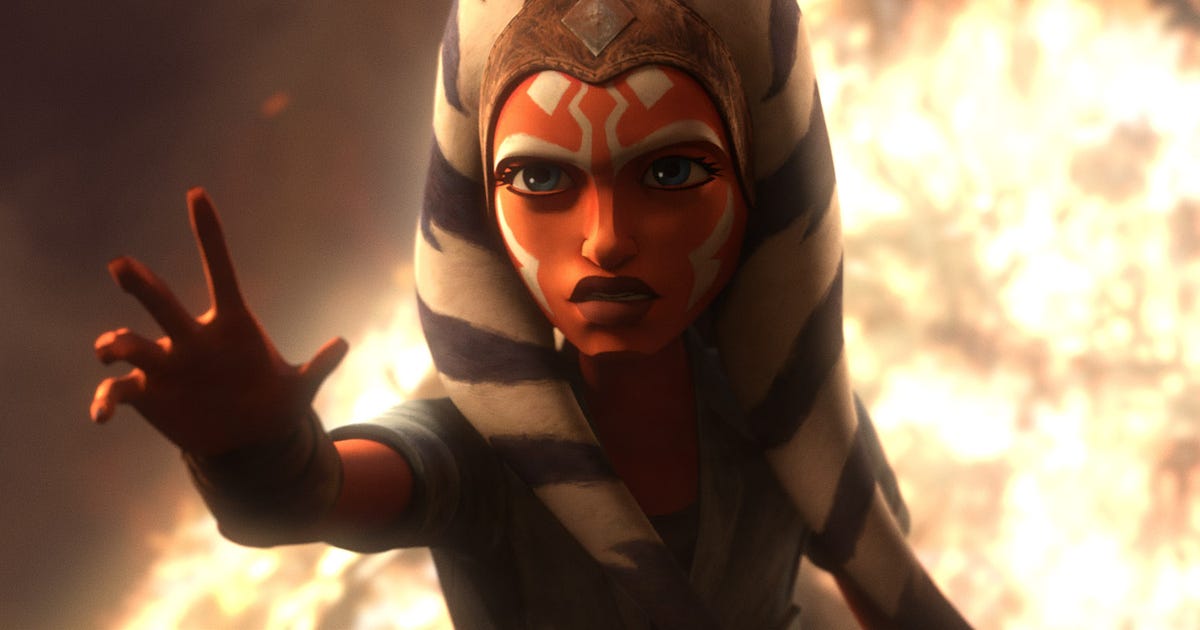
Star Wars: Tales of the Jedi came to Disney Plus on Wednesday, bringing six shorts in the same CGI animated style as The Clone Wars. Three follow legendary Jedi Ahsoka Tano (years before her encounters with The Mandalorian), with the others revealing the backstory of future Sith Lord Count Dooku during his career as a Jedi.
It’s set in the prequel era, decades before the events of original Star Wars movie A New Hope and current live-action show Andor.
The series is written by Clone Wars executive producer Dave Filoni, who’s currently working on the live-action Ahsoka series that’s scheduled to hit Disney Plus next year. He wrote the episodes while flying back and forth to shoot The Mandalorian.
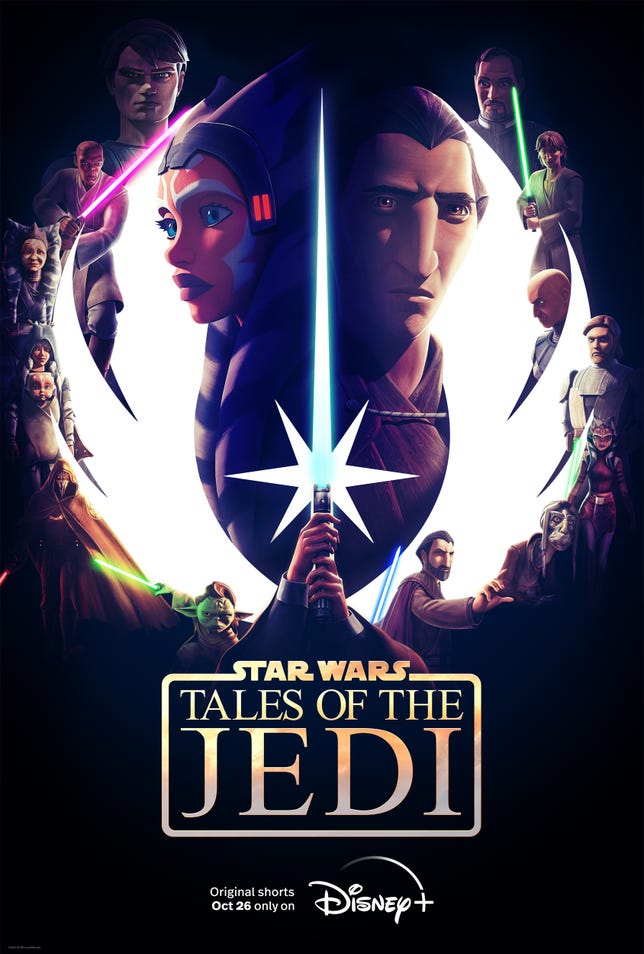
The shorts tell the contrasting stories of Ahsoka and Dooku.
Lucasfilm
Tales of the Jedi sees Ashley Eckstein return as Ahsoka, having voiced the character since her debut in 2008’s The Clone Wars movie, TV series, follow-up show Rebels and The Rise of Skywalker (Rosario Dawson plays the role in live-action).
In addition to her acting work, she also founded fandom-focused fashion label Her Universe and voice-guided meditation series Star Wars: Mindful Matters and co-wrote activity, recipe and craft book Star Wars Everyday.
Also back for the shorts is Corey Burton as the voice of Dooku, a role he first played in The Clone Wars video game, which came out exactly 20 years ago Friday. Inspired by the performance of the Sith Lord’s live-action actor Christopher Lee, he continued to play the role in the 2008 The Clone Wars show. He also voiced bounty hunter Cad Bane in that series and The Book of Boba Fett.
Beyond Star Wars, Burton has played an astounding number of roles across a 50-year career, portraying a wide array of Disney, Marvel, DC, Looney Tunes and Transformers characters. You’ve undoubtedly heard his work many times.
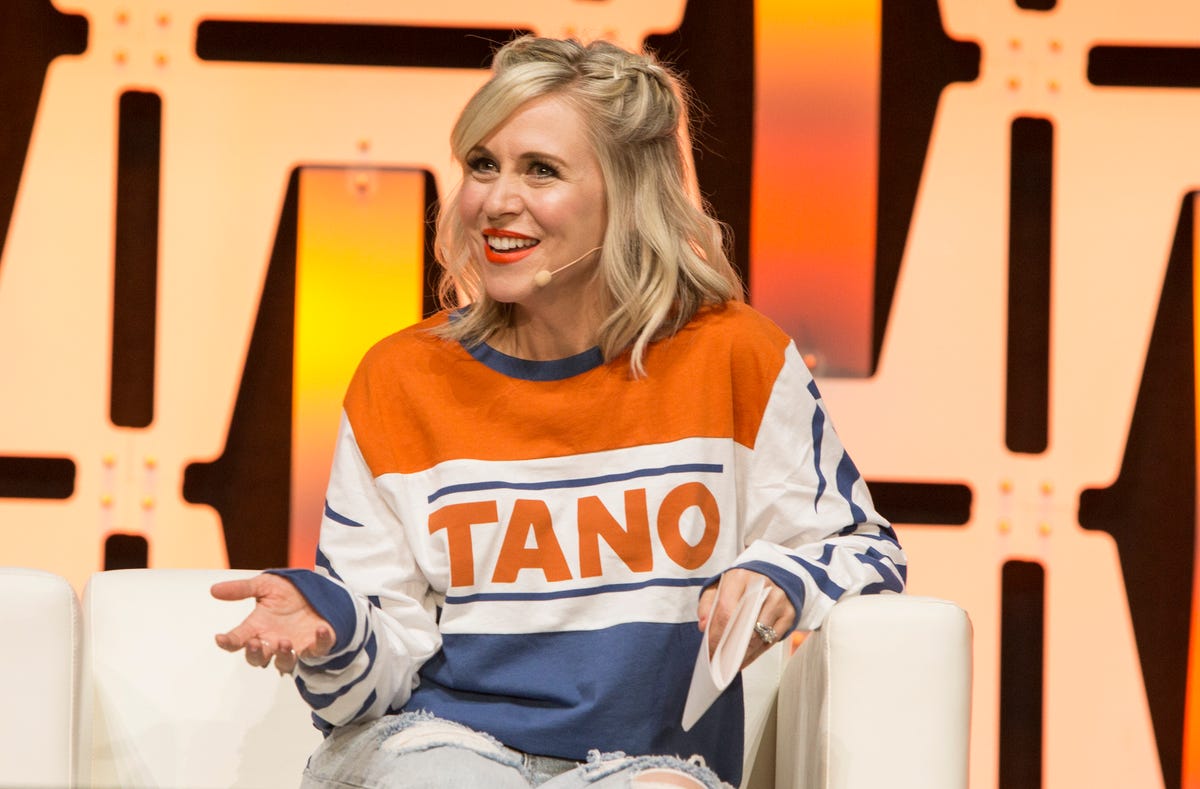
Ashley Eckstein, seen at Star Wars Celebration Chicago 2019, was the first actor to play Ahsoka.
Barry Brecheisen/Getty Images
I got to have fun one-on-one chats with both Eckstein and Burton over Zoom about returning as Ahsoka and Dooku in Tales of the Jedi, touching on favorite episodes, how their approaches to the characters have evolved, Yaddle’s manner of speaking and the ongoing influence of Star Wars creator George Lucas.
Here’s a transcript of our conversations, edited together for clarity and woven together like Tales of the Jedi. Minor SPOILER warning for the episodes.
Q. Ashley, do you have a favorite Ahsoka episode?
Eckstein: Practice Makes Perfect [the fifth episode], just because it was really nice to get the gang back together [several other Clone Wars actors reprise their roles]. And it was just really cool to see all of the connections — there were so many layers in that episode. It made you smile; it made you laugh. It made you cry; it broke your heart. I don’t know how in the world Dave Filoni packed so many emotions into one episode, but it was truly brilliant.
I only got the script pages for my lines, so I didn’t know how the episode ended. So I was completely shocked to find out. And trust me, there were definitely some tears shed.
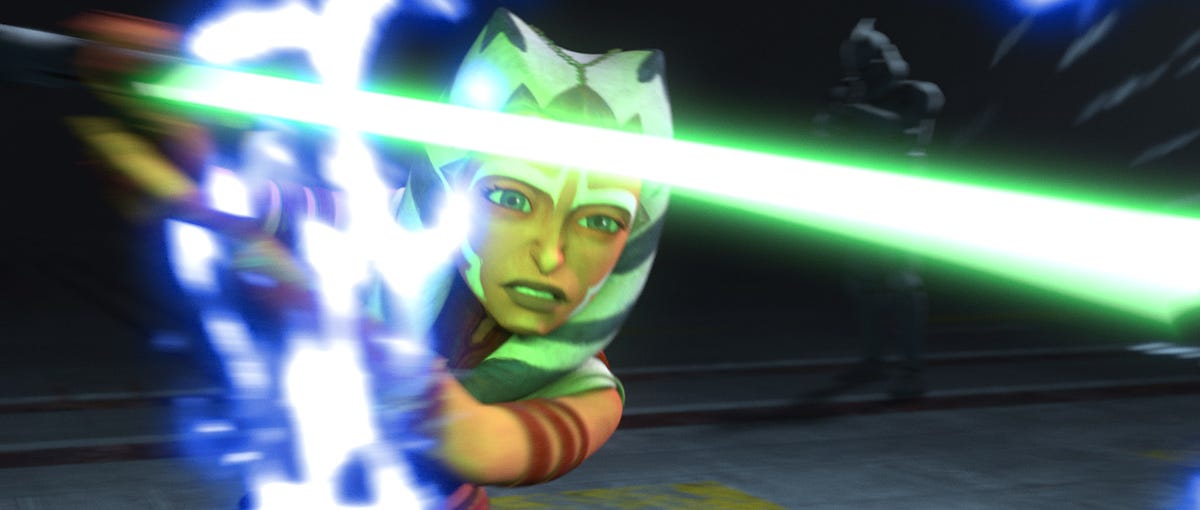
Ahsoka trains in the skills that’ll help her survive Order 66.
Lucasfilm
Practice Makes Perfect is fascinating because it jumps to multiple points on the timeline and Ahsoka’s career. How has your approach to playing the role evolved?
Eckstein: I feel very fortunate because I was cast as Ahsoka to just be myself, and I really got to help create the character. I never wrote for the character, because Dave and his staff wrote the most brilliant stories. But I had a lot of input in terms of her voice — her humor, her sarcasm, her snippiness.
Ahsoka is truly a part of my heart and soul at this point. And because she’s so much of my personality, it’s kind of easy to jump back into it. The tone of her voice depends on her age. With Tales of the Jedi, it’s the early days of Ahsoka, so I went back and I watched the Clone Wars movie, episodes from season 1. So it definitely was a blast from the past, and it was a lot of fun.
Is it a bit concerning that she got stunned so many times while training with the clone troopers?
Eckstein: Since my husband [former MLB player David Eckstein] used to play sports, my brain went to “Oh, she might have a concussion.” Really, what brought me to tears was how much Anakin can love her. He knew that if she only trained the way that the rest of the Jedi trained, that she wouldn’t survive, and I’m just talking about day-to-day life — I’m not talking about Order 66. He needed to do this different way of training.
That’s what just makes it even more heartbreaking. What I love about The Clone Wars is that we get to see hero Anakin — just to see what could have been, had he not gone to the Dark Side. Was he hard on her? Absolutely. But did he save her life? Absolutely. That short just took that love, which is like a brother and sister, to a whole new level.
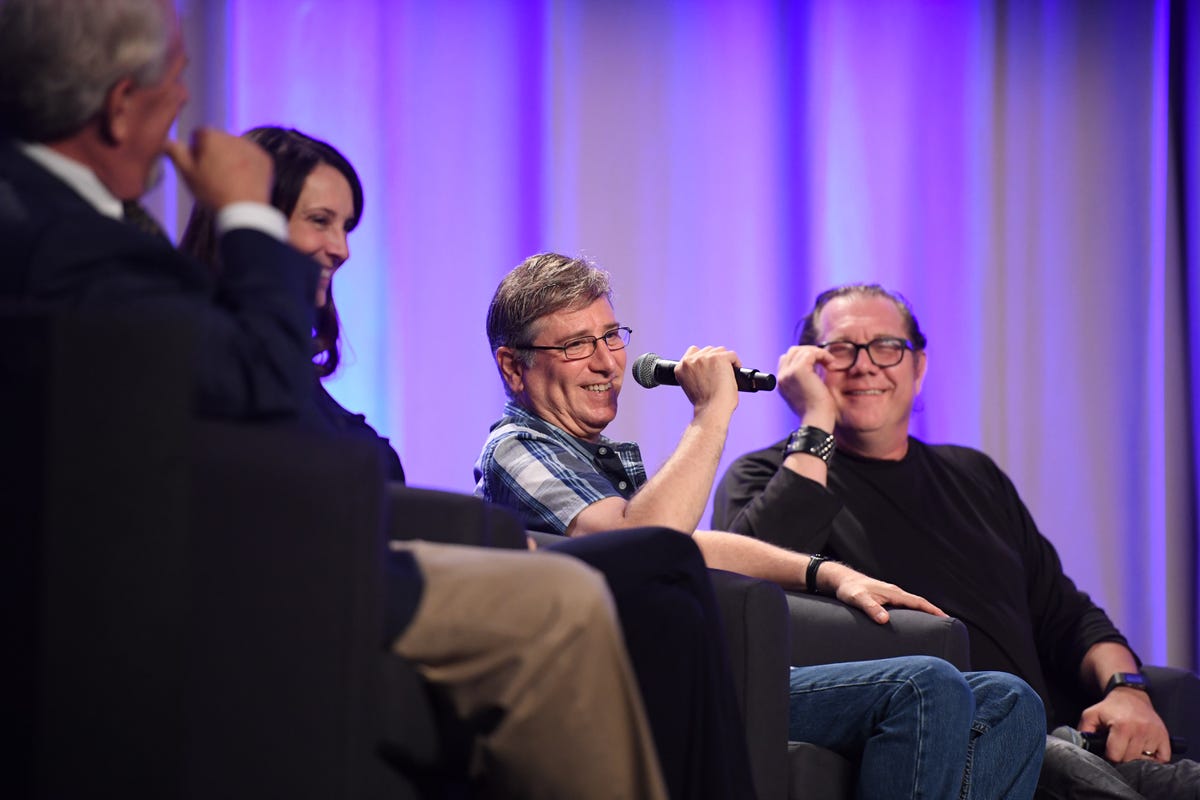
Corey Burton, seen onstage at Disney’s D23 Expo 2017, has fun playing Dooku’s duality.
Getty Images
Corey, you’ve played Dooku for two decades, how has your relationship with the role evolved?
Burton: I’m a radio actor, so I’ll dive deeply into the role when the pages are in front of me, the director’s in my ear — I try to perform what’s in the director’s head. A good director will transmit the intentions of the writer to me. If it’s really good writing, the character is right there on the page.
[With Dooku], I began by imitating Christopher Lee, and trying to replicate his performance. When we started The Clone Wars series, we were told through Dave Filoni, from George Lucas, to own the characters, because he wasn’t going to be doing films anymore.
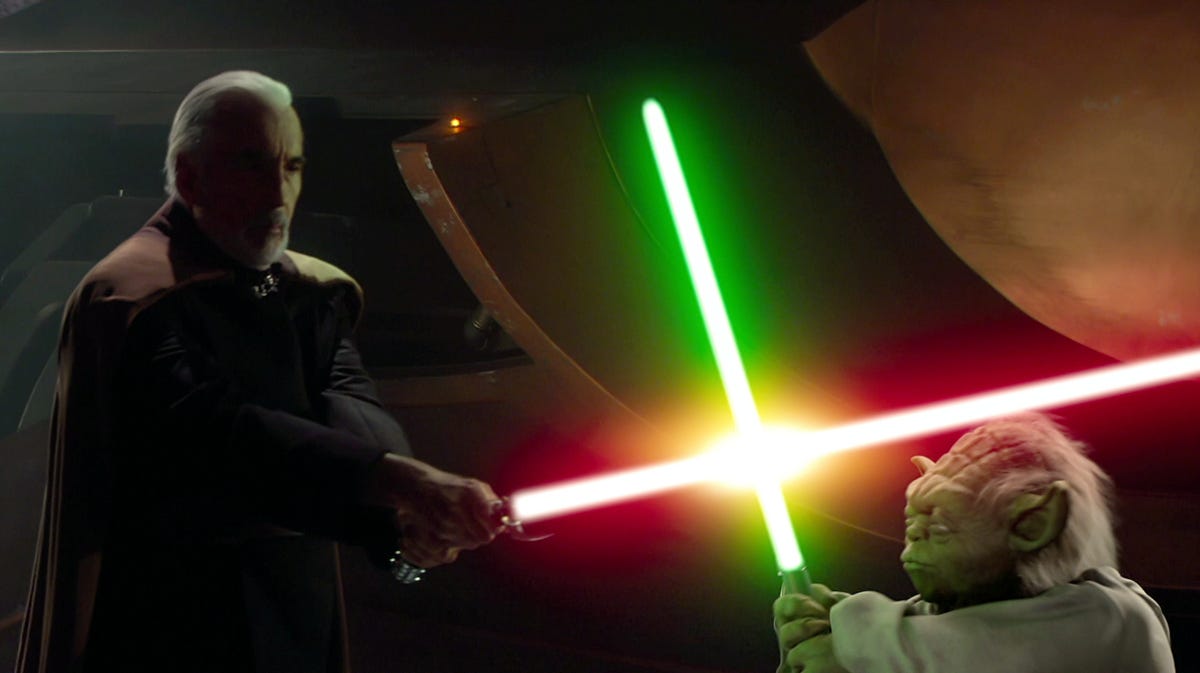
In his early days as Dooku, Burton mirrored Christopher Lee’s performance in Attack of the Clones.
Lucasfilm
So it was all animation, and we were the cast, so it did change. Along with Dave, the writers and the other people involved with the character, we gave him better dimension, making him more the duplicitous, unfailingly polite politician, and younger, more muscular. Though underneath it all, there was always the dark Sith.
Dooku has an intense encounter with Yaddle in his third episode, The Sith Lord. She’s of the same species as Yoda but doesn’t speak with the same unusual syntax as Yoda — I’m interested in your take on this as a voice actor.
Burton: I tend to be a little bit foggy on the details of the various species. I don’t know that I ever got a clear explanation of why Yoda speaks in his own particular syntax — we don’t know if Grogu (aka Baby Yoda, from The Mandalorian) will.
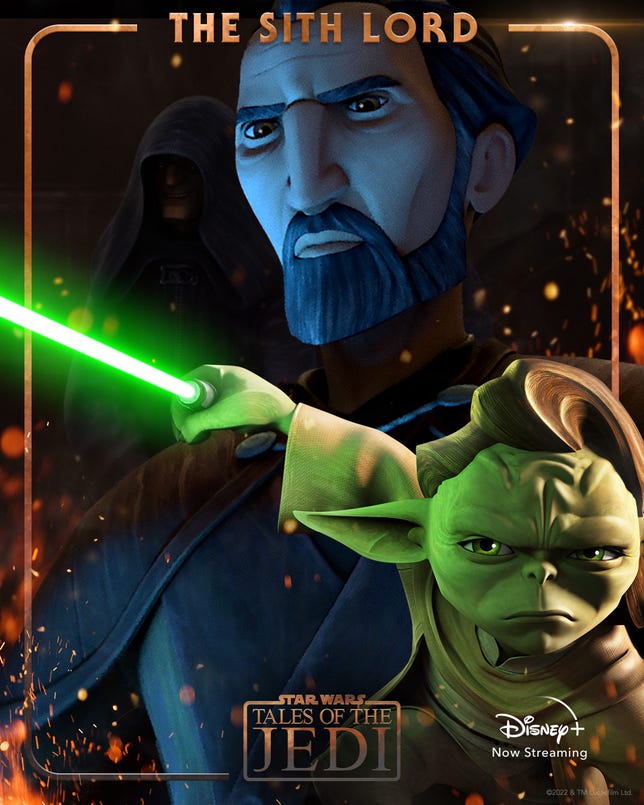
The fourth episode takes a Sith-y turn.
Lucasfilm
That could be a thing very specific to the character, especially because Yoda is a trickster; everything is riddles and puzzles from the great master and teacher. Maybe we’ll find out if that’s a technique of Yoda himself.
In the same episode, it’s so fun to watch Dooku choosing between Yaddle and Darth Sidious. Logically, we know he’s gonna fall to the Dark Side, but it’s easy to get caught up in his uncertainty in the moment and feel like he’s sliding back and forth between light and dark.
Burton: It’s fun as an actor to slide from light to dark like that. It could happen with any transformation; suddenly this little hint of the future slips through — the other side is just blasting to get out.
Tales of the Jedi juxtaposes Ahsoka and Dooku, two Jedi who left the Order to go down very different paths. Why do you think that works so well?
Eckstein: I think we’re fooling ourselves if we don’t think that we’re a balance of the light side and the Dark Side; we wake up every single day with a choice.
I’m a huge advocate for mental health. We all have feelings of anger, aggression, worry and doubt. We also all have, you know — we can choose to have feelings of peace, calm, love, kindness and light. We can’t always control the things that happen to us, but we can control how we react to those situations, and then the choices we make from there.
Ahsoka has had so many terrible things happen to her; we see those unfold in The Clone Wars, Rebels and Tales of the Jedi. In reacting to those things, she chooses love, she chooses to help people, she chooses kindness. And Dooku obviously chooses a very different path.
How do you think George Lucas’ legacy continues in Tales of the Jedi? You’re both part of a fairly small group of actors who’ve worked on Star Wars since his time.
Eckstein: Dave Filoni is definitely George Lucas’ Padawan; it’s a role he takes very seriously and he wants to honor George however he can. I don’t think there’s anyone that has truly been trained by George Lucas like Filoni. So I think if it’s a project that Dave works on, there’s definitely going to be pieces of George.
I hope George is proud of Tales of the Jedi — I don’t know if he gets enough credit for The Clone Wars, because he worked on it tirelessly and it was a real passion project for him. It was funded by him in the pre-Disney days when we got to make it for five seasons. And I can’t say that other places would have even stuck with an animated show for the five seasons that we did. So I’m very grateful towards George Lucas. And I do think that his legacy lives on in this show.
Burton: Dave is in touch with George all the time, as far as I know. The way Dave talks about George [suggests that] he’s kind of Yoda-like himself, saying “He’s always goofing on me.”
Everybody is branching off of his vision, and hopefully we all keep in line with … what he envisions for the whole Star Wars universe.
